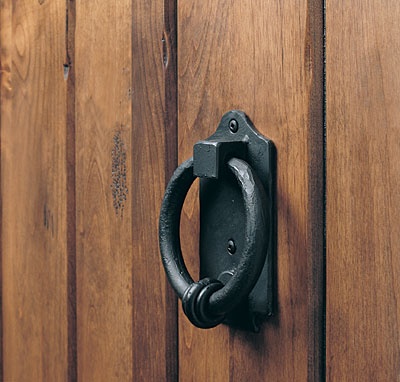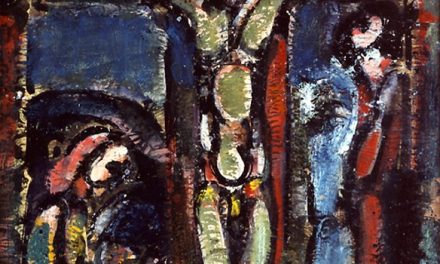Reflections for July 24, 2011
17th Sunday in Ordinary Time
2 Kings 3:5, 7-12
Rom. 8:28-30
Mt 13:44-52 or 13:44-46
What do you love most in this world? What most captures your imagination? For what would you sacrifice all that you have? Your family? Your career? Your reputation? Your life savings?
In this week’s gospel, Jesus’ parables remind us that as Christians, what we should most love, what should most capture our imagination, what we should be willing to sacrifice everything else for is the Kingdom of heaven: “The kingdom of heaven is like a treasure buried in a field, which a person finds and hides again,and out of joy goes and sells all that he has and buys that field” (Mt. 13:44). The kingdom of heaven is a kingdom of “love, justice, and peace” and “the righteousness and peace and joy in the Holy Spirit” (Roman Catholic Catechism 2046, 2819). In the Gospel of Matthew, the kingdom of heaven (or kingdom of God) which Jesus speaks of here is made present in the person of Jesus, and the author of Matthew provides us with several vivid examples of people giving up all that they have for this treasure. The call of Matthew (Mt. 9:9) shows Matthew giving up his career (and presumably a lot of wealth) to go and follow Jesus. Earlier in chapter eight, an unnamed disciple gives up his family to follow Jesus: “Another of his disciples said to him, ‘Lord, let me go first and bury my father.’ But Jesus answered him, ‘Follow me, and let the dead bury their dead'” (Mt. 8:21-22). Jesus warns his disciples that following him will mean that they may suffer, face persecution, and even lose their life (Mt. 24:9-14). We also see an example of someone who was not willing to give all that they had to follow Jesus in the story of the rich young man (Mt. 19:16-22). This earnest young man wants to follow Jesus but cannot give up his possessions in order to do so. In reflecting on this sad moment, Jesus tells his disciples, “Truly it will be hard for a rich person to enter the kingdom of heaven. Again I tell you, it is easier for a camel to go through the eye of a needle than for someone who is rich to enter the kingdom of God” (Mt. 19:23-24).
This week’s gospel should cause us to ponder what it is that we cannot give up in order to follow Jesus. The gospel compels us to ask where it is that we have put our treasure, because as we know, where our treasure is, there also is our heart (Mt. 6:21). And the moral imperative of this week’s gospel is that we need to cling a little less tightly to those things that we treasure most if we want to be able to go and follow Jesus when the opportunity presents itself.
This morning, the Dallas Morning News featured an op/ed by William McKenzie illustrating how Dietrich Bonhoeffer was willing to give up all that he had to follow Jesus (unfortunately, you have to subscribe to get a full link to the post). Bonhoeffer was a German Lutheran pastor and theologian who was imprisoned and executed at only 39 years old for his role in a failed plot to assassinate Adolf Hitler. In the early 1930’s, when German churches were being co-opted by pro-Nazi Christians, Bonhoeffer was vocal in his opposition to Nazism, calling on the Church not to conform but to resist (Karl Barth, another prominent theologian, joined Bonhoeffer in his resistance, drafting the Barmen Declaration and insisting that Christ, not Hitler, was the head of the church). A committed pacifist, Bonhoeffer also worried about the possibility of conscription into the German army, a concern that led him to seek refuge in the United States as Union Theological Seminary. Despite the danger of returning to Germany, Bonhoeffer eventually realized that his own call to discipleship compelled him to leave the safety of the seminary, as he explains in a letter to Reinhold Niebuhr:
I have come to the conclusion that I made a mistake to coming to America. I have to live through the difficult period of our national history with the Christians in Germany. I will have no right to assist with the restoration of Christian life after the war in Germany if I do not share the tests of this period with my people.
Upon returning to Germany, Bonhoeffer, with palpable guilt, set aside his pacifist convictions and joined the Abwehr movement’s plot to assassinate Hitler. He was arrested and imprisoned for a year and a half before finally executed by hanging in 1945.
Bonhoeffer’s story is a compelling one to Christians today because he was willing to sacrifice his life in the call of discipleship. So few of us today will ever face the possibility of martyrdom that contemporary martyrs always stand out in our imagination. But McKenzie sees in Bonhoeffer’s story another element of “costly discipleship”:
A man who died for his beliefs naturally captures our attention. His clear stand delineates the difference between good and evil. But another element, equally relevant, often gets overlooked: This fierce man of faith compromised his beliefs for the larger good.
Bonhoeffer was a pacifist. But as he saw Hitler’s wickedness unfold, he got in the fight. He joined a group that believed killing Hitler would serve the larger good. A man who once prayed that God would give him the strength to not take up arms didn’t get to that point without considerable soul-searching. But he compromised his belief in non-violence to try to stop Hitler.
We often do not think of sacrificing our ideals or our principles in the call to follow Jesus, but Bonhoeffer’s life is instructive that at times, we may have to do so. We may feel convicted that gay relationships are an abomination before God, but still be called to set aside that conviction to attend the wedding or adoption ceremony of a gay child or friend whom we love. We may feel convicted that abortion is the murder of the innocent, and yet be called to set that conviction aside in showing love and hospitality to our neighbor who runs the local Planned Parenthood clinic or the church member who admits that she has had an abortion herself. We may feel convicted that eating meat is morally wrong, but be forced to set aside that conviction at the sight of Grandma’s expectant face as she loads your plate with her famous pot roast.
Now, I am not saying that we should start thinking of our moral convictions as unimportant. In fact, following Jesus may mean that we will be called to die for our moral convictions, to lose our job or our reputation fighting for what we know to be right (see M.T. Davila’s excellent recent post about costly discipleship). We should never sacrifice our moral convictions lightly, and when we do, we should realize that, like Bonhoeffer, we may may incur guilt. I am reminded here of a story one of my professors told me about a friend who was very committed to the anti-abortion movement who was forced to compromise his convictions when his daughter’s teenage friend discovered she was pregnant. The girl came from a broken home and knew she could expect little support from her parents. The friend offered to help her with pre-natal care and even putting the child up for adoption, but the girl eventually decided she simply could not go through with the pregnancy and chose to get an abortion. My professor’s friend, despite the fact that he strongly disapproved of her decision (and even considered it murder) chose to drive her to the abortion clinic and wait with her so she would not have to be alone at such a difficult time. He felt guilty in cooperating with her evil, but knew that he would also be guilty if he left her to face the abortion alone, without love and compassion and support.
We need wisdom (what is sometimes called prudence) to be able to discern right from wrong in a given situation, especially when it seems we may have to do something we know to be wrong in order to heed the call we have been given as disciples. As we see in our first reading, wisdom is not just about knowing the rules, but it is also about having “a wise and understanding heart.” The gospels reveal Jesus as the paradigm of such wisdom, with the heart to know when to break the Sabbath rules in order to heal (Mt. 12:9-14) or to break the ritual purity laws in order to show compassion (Luke 8:40-48).
The third parable from our reading this week also helps us make sense of this type of “costly” discipleship that may demand that we sacrifice our moral convictions to serve the Lord:
Again, the kingdom of heaven is like a net thrown into the sea,
which collects fish of every kind.
When it is full they haul it ashore
and sit down to put what is good into buckets.
What is bad they throw away.
Thus it will be at the end of the age.
The angels will go out and separate the wicked from the righteous
and throw them into the fiery furnace,
where there will be wailing and grinding of teeth.
We depend on God for ultimate judgment, for it is God who will ultimately sort the wheat from the tares (as we heard in last week‘s gospel). For us in the church now, the kingdom of heaven that Jesus preaches is both present and future, both something which has already begun, but is not yet complete. In this already/not yet state, all of us are a mixture of weeds and wheat, good fish and bad. We may have strong moral ideals which are impossible to live out in the sinful world we find ourselves in (something St. Augustine knew so well). It is ultimately by God’s grace that we are justified, and this should give us a certain amount of humility, not relying on our own righteousness as an opportunity to criticize what we see as a lack of righteousness in others, but rather, extending the same mercy we hope to receive from God to others who may need it now. When we extend such mercy, when we put the call of discipleship above all else, when we are willing to sacrifice everything else for the treasure which we know in hope is ours, the kingdom of heaven is made more fully present here on earth. Maranatha!




Trackbacks/Pingbacks